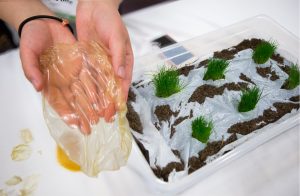Crustacean-shell plastic might save the planet

A member of the AgriC team displays their prototype of chitin-based plastic.
Plastic made from crustacean shells sits atop a pan of dirt and growing plants. In front of the prototype display, four University of Washington students stand – and are swarmed by judges. Team AgriC is pitching a project taking chitosan – a derivative of chitin, a sugar obtained from the hard outer skeleton of shellfish that is commonly discarded as waste – and using it to produce biodegradable plastic for agricultural use.
AgriC started working on an alternative to plastic mulch contamination as students in fall quarter’s Environmental Innovation Practicum, a class that prepares students to participate in the Alaska Airlines Environmental Innovation Challenge – a competition that took place this year on March 31. Their goal was to show that there’s an alternative to plastic mulching, which produces 900 million pounds of waste each year.
“All we had in the beginning was a research paper stating that plastic could be made from chitosan,” said Daniel Park, a finance and entrepreneurship student on the team. “From that article, the entire team put in a lot of effort to research and find a market, network with professionals, interview potential customers, create a prototype and practice our pitch.”
After months of work, the four students – Park, Moni Pal (economics), Andy Tan (biology) and Jade Xinyao Ding (environmental engineering) – demonstrated their prototype at the Challenge and took home the $15,000 Wells Fargo grand prize. What’s next for the team? Ding says they’re working on continuing to improve the technology with a goal of getting the product onto the market next year.
The Alaska Airlines Environmental Innovation Challenge is in its eighth year of providing a platform for students seeking to solve the world’s most pressing environmental problems. Along with the $15,000 awarded to AgriC, Ionic Windows – developing membranes for emerging grid-scale energy storage technology – was awarded the $10,000 Herbert B. Jones Foundation second place prize as well as the $5,000 UW Clean Energy Institute Clean Energy Prize. The $5,000 Starbucks third place prize went to ETA1 for their device converting wasted heat energy from engines into electrical energy that increases fuel economy.
